Investing can be one of the most complex concepts to understand and master in personal finance, but it is the cornerstone of achieving financial independence and building wealth.
How much money do I need, how do I get started, and what are the best investment strategies for beginners? These are some very common questions anyone looking to tap into the investment market has.
In this article, we will provide a comprehensive guide to investment for beginners, covering everything a new investor needs to know to enter this dynamic market confidently in 2024.
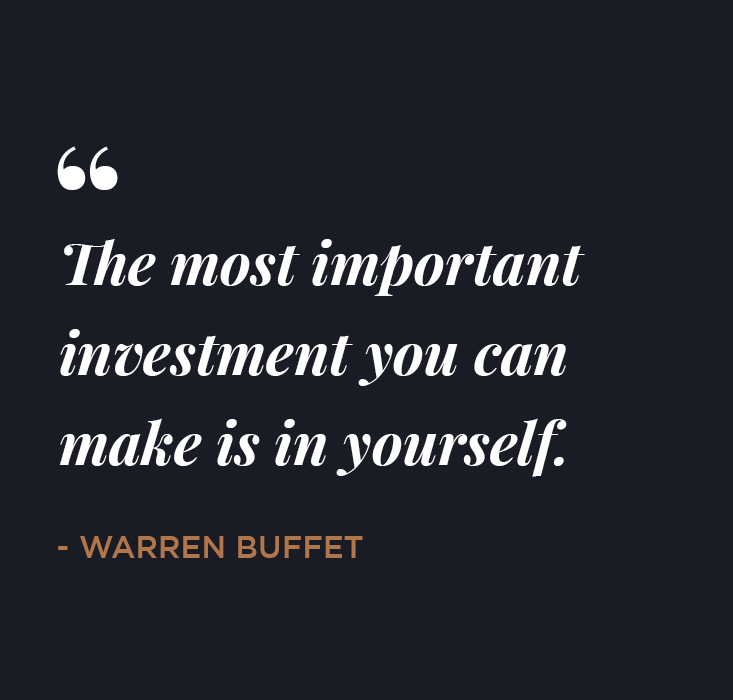
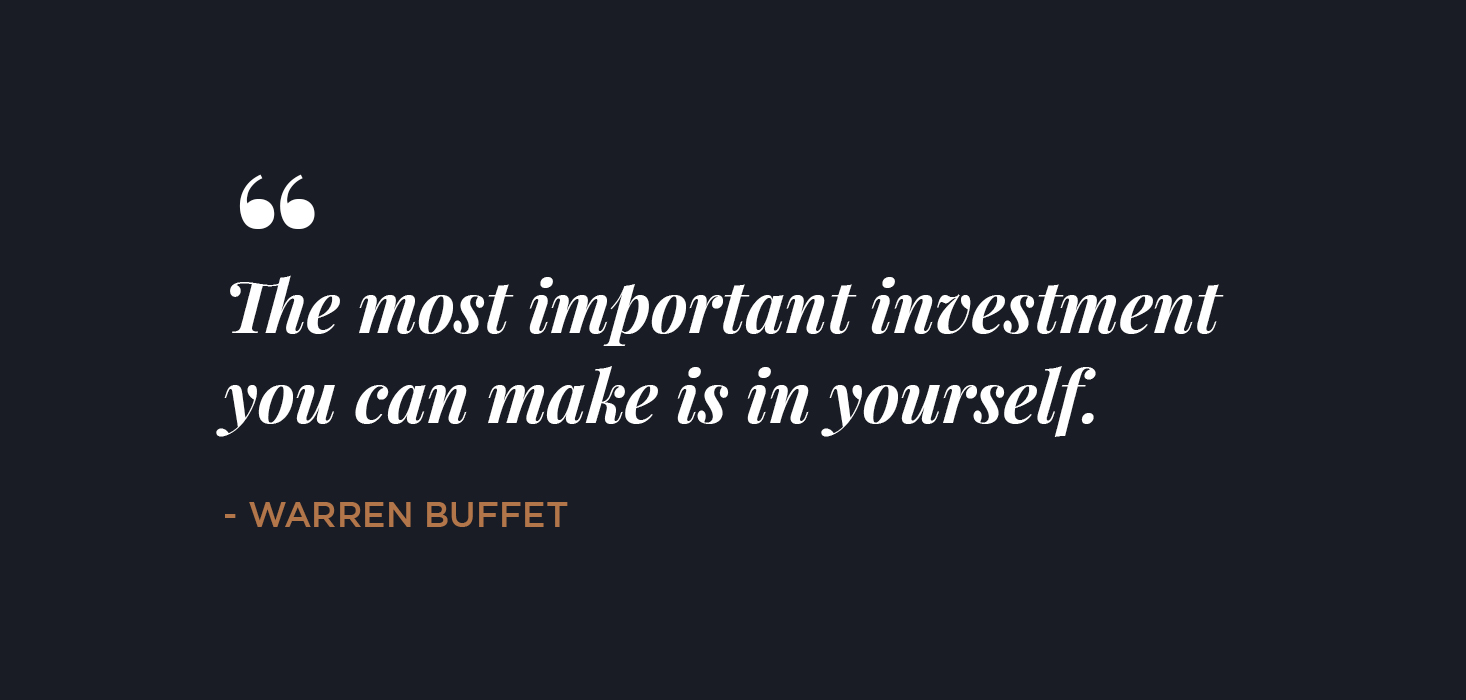
Starting with the basics, investing, in simple terms, is setting aside money for the future and putting it to work for you. When you invest, you essentially purchase something you believe will increase in value over time.
The risk here is that there are no guarantees that they can pay you back with the returns or values you expect.
In fact, the value of any investment can fluctuate depending on market conditions and many other factors, so you could get back less than you invested or vice versa. This is why when you learn how to invest, risk tolerance and management are crucial topics to master.
In other words, investing provides another source of income that can fund your retirement and help you overcome financial hurdles. It grows your wealth, helps you meet your financial goals, and increases your purchasing power over time—all while letting your money work for you.
Today, there are many diverse investment options that you can choose from. However, they all have their pros and cons and require unique strategies to obtain successful returns.
The right time to invest depends on the primary financial goals you want to focus on at your current age.
Generally, the earlier you invest, the more you will be able to enjoy the returns at their fullest. This means the longer the investment horizon you’re willing to cultivate, the better chance you will have to realize extended annualized returns on your investments.
When you are young, you will have most of your earnings years ahead, and your focus will likely be on building up capital to safeguard your future.
Once you get married and build a family, you will prioritize your family’s needs and plan for your children’s educational pathway. As you age, you will likely focus on securing your retirement lifestyle.
Always remember there is more to investment than for retirement. Investing can help you buy a home, travel, start a dream project, and generate a steady stream of passive income to pay your bills in the future without compromising on your lifestyle.
The minimum amount required to start investing can be different across demographics. It should be based on your unique financial situation and an effective investment strategy that works for you and your budget.
As a general rule, allocate a set percentage of your net income to investments. This percentage can vary according to your income, savings, and debts. Most of them invest somewhere around 15%-25% of their income.
You can also use the 50/30/20 budgeting strategy to understand how much you can allocate for investments from your monthly income. This strategy breaks down your income into three categories: your needs (50%), wants (30%), and the remaining 20% for debt repayment, savings, and investments.
While for some, investing 10% of their monthly income isn’t feasible, it shouldn’t be a reason not to invest at all. In fact, investing is less about how much you’re investing and more about how much time your investment has to appreciate in value to give out returns.
One of the main reasons people are hesitant to start investing is due to the risk factor involved. The truth is that risk is one of the crucial or rather inevitable components of investment.
All types of investment involve some risk. Risk is the degree of uncertainty or the potential to incur a loss within an investment decision.
Investments with minimal chance of loss offer stable but lower returns. Examples – savings accounts and government bonds.
Investments with balanced risk and return potential often involve slight volatility. Examples – blue-chip stocks, dividend stocks, and corporate bonds.
Investments with significant return potential are prone to substantial value fluctuation, primarily due to market conditions. Examples – stocks and real estate.
This includes highly speculative investments with extreme profit potential but an equally high likelihood of loss. Examples include startups, private equity, and cryptocurrencies.
Every investment option has its own risk vs. return ratio. These differences generally relate to how readily investors can get their money when they need it, how fast their money will grow, and how safe their money will be.
The risk vs return principle in investment has a positive relationship. It means that investors willing to take high risks can expect the benefit of higher returns, whereas low risks contribute to low returns.
In other words, this principle states that investors should be willing to take high risks beyond their comfort zone to achieve higher returns.
Conversely, those who want some control, stability, and predictability on their returns can settle for low-risk options.
This tradeoff helps investors decide based on risk tolerance, investment goals, and time horizon.
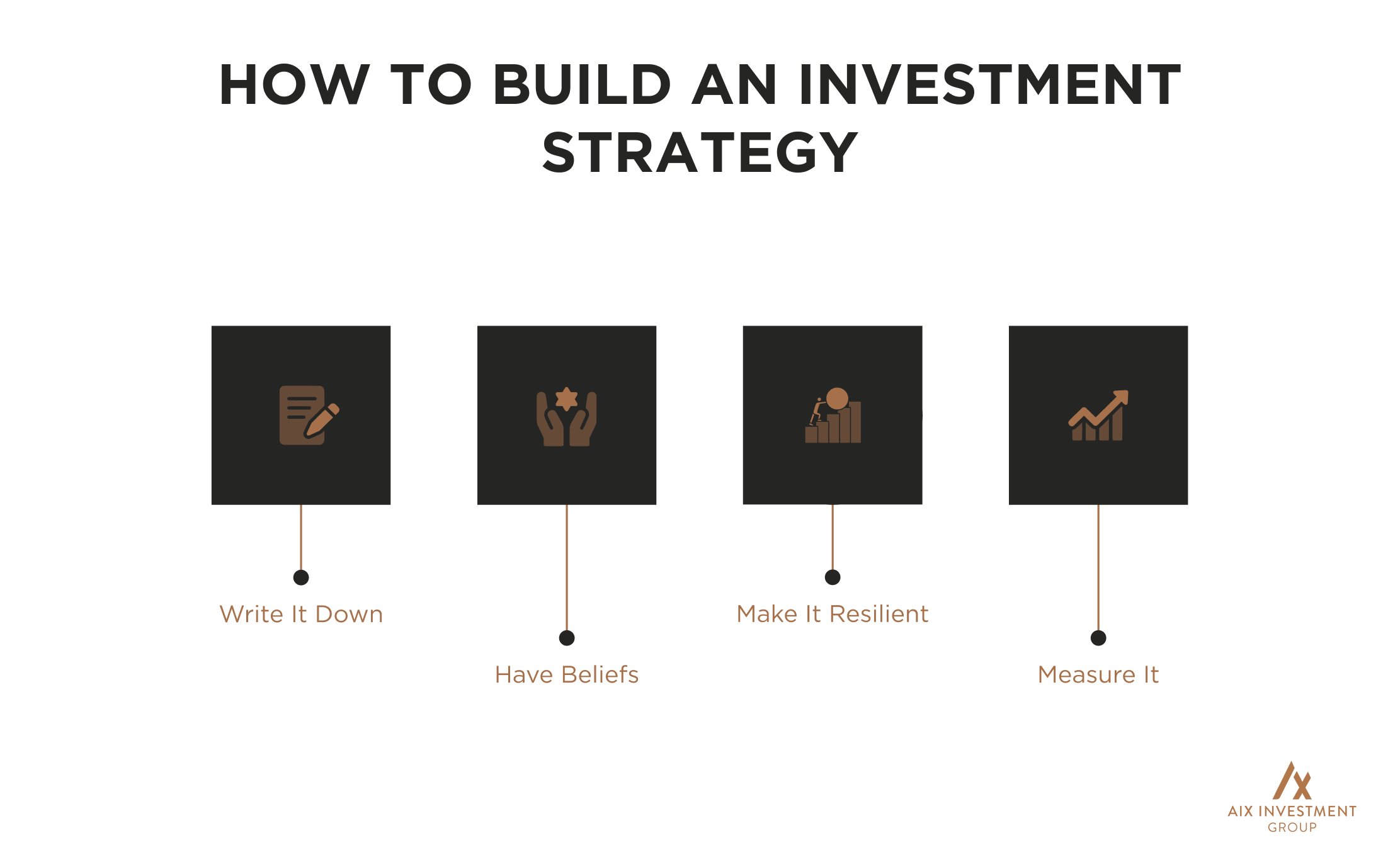
Behind every successful investment is a written, measurable, and repeatable investment strategy. Just like how a house cannot be built without a blueprint, every successful investment calls for a strategy. Here are four simple steps to help you build a sustainable investment strategy.
Describe what you are doing and what you are expecting as a process. Doing this will help you articulate it and give you something to revert to in times of chaos, preventing you from making emotional decisions.
Make sure what you write down matches your long-term investment objectives. It also provides a guide to investment for beginners to review and change decisions if there are any potential drawbacks in reaching expected objectives.
Following a standard set of beliefs can guide you towards the right investment decisions. This includes understanding or believing why some investments become over or undervalued and how to exploit those.
These beliefs can come from industry knowledge, special research, or from professional investors or advisors you know of.
Once you know your competitive advantage, you should understand how to execute a long-term trading plan to utilize it profitably.
However, when you learn how to invest, remember that your competitive advantage can eventually lose its profitability simply because other investors are implementing the same strategy.
A good investment strategy should perform well in every market environment. This requires having a thorough knowledge of your strategy’s strengths and weaknesses.
Especially as market trends and economic cycles change, sometimes, even great investment strategies for beginners will have their own share of good performance and periods where they experience lagging.
Understanding your strategy’s weaknesses helps you maintain confidence in your decisions, even if your strategy seems temporarily out of track. It can also help you find other options that complement your strengths when needed.
You will never know how to predict, track, or improve something you do not measure. So, make sure to have benchmarks for your investment decisions.
These measuring criteria should match your investment objectives and the levels of risk you are willing to take, i.e., risk tolerance.
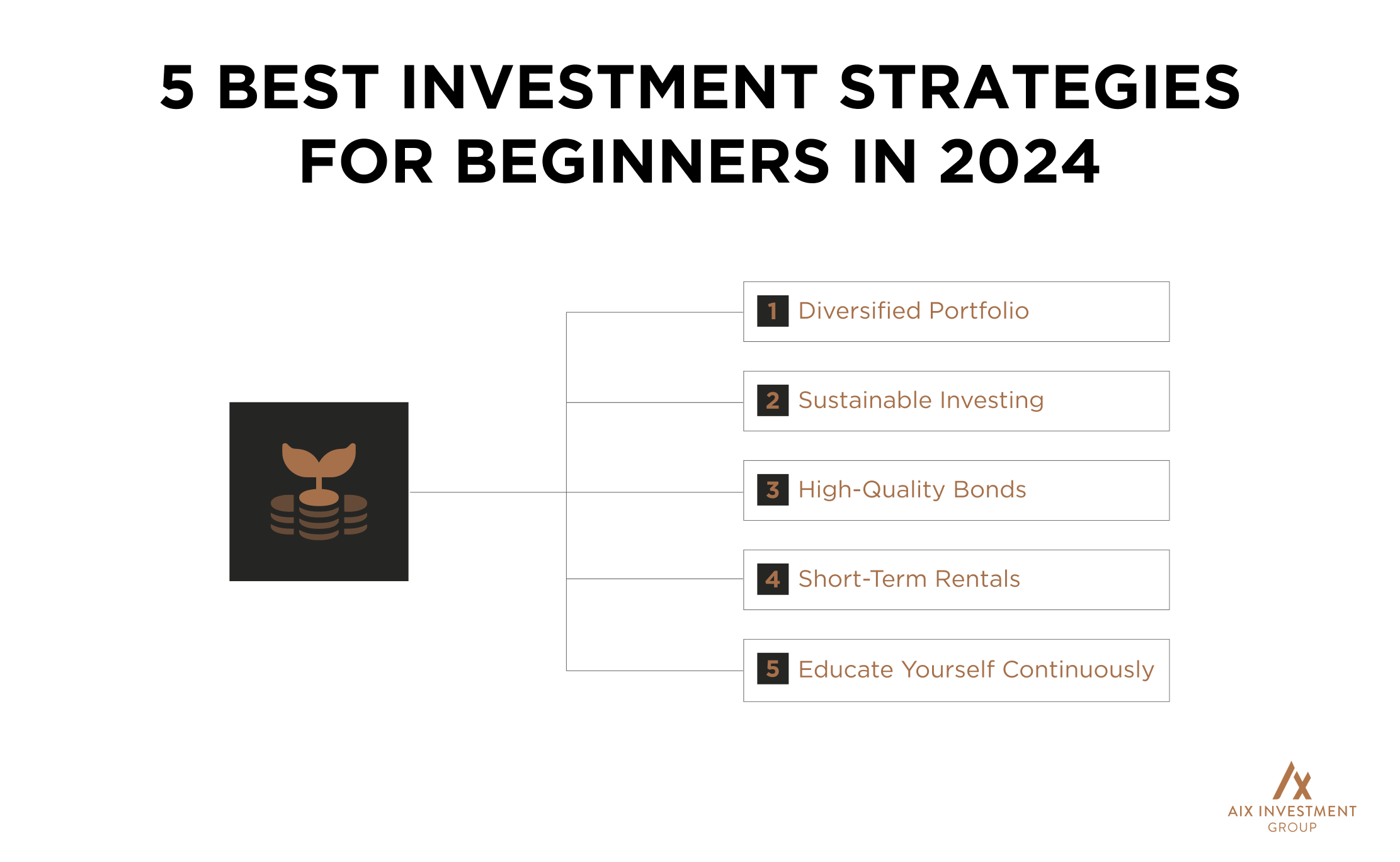
This investment strategy focuses on spreading your money across different investment options, asset classes, or sectors to minimize the risk of losses. The diversification investment strategy goes by the famous investment principle of “not putting all your eggs in one basket.”
Investing money for beginners comes with many doubts and uncertainties. It takes a trial-and-error process. By investing in a diversified portfolio, investors can offset the poor performance of one option with the better performance of another.
This approach helps protect against market volatility and unexpected downturns, promoting long-term financial stability.
Year by year, we as a community are marching towards a sustainable world by making thoughtful decisions. A sustainable investing strategy involves making investment choices based on environmental, social, and governance (ESG) criteria.
It is based on the principle that generates returns while making a positive impact on the world, whether through clean energy, green or ethical business practices, or social responsibilities.
It allows investors to feel satisfied that their money is contributing to long-term sustainability and responsible growth while also benefiting them.
Examples include Green Bonds, ESG Mutual Funds & ETFs, Socially Responsible Investing (SRI), Impact Investing, Sustainable Real Estate, and Renewable Energy Stocks.
A good investment for beginners is one that essentially provides a steady income with capital preservation, which high-quality bonds are well-known for. Government and corporate bonds are a very strong investment strategy to consider this year.
They also prove best in the face of economic uncertainty and potential market volatility, two areas new investors find challenging to manage.
Also, with global inflation rates showing signs of stabilizing after recent hikes, these bonds are highly likely to yield better returns than the low-rate environment in the past few years.
Short-term rentals have captured significant interest in the real estate sector, positioning themselves as one of the best investment strategies for 2024.
Firstly, the post-pandemic travel surge has spiked demand for short-term rentals or accommodations in popular tourist destinations and urban centers.
Similarly, the adaptation of remote work culture has allowed most 9-5 professionals to indulge in a trend of “workcations,” blending travel with work.
Secondly, property management software and dynamic pricing tools now simplify investors to optimize rental prices and simultaneously manage properties efficiently.
Furthermore, given rising property values and rental rates, short-term rentals can yield significantly higher returns compared to traditional long-term leases, making them a compelling option for new investors who are seeking to maximize cash flow and flexibility.
Mastering the art of investment for beginners takes plenty of learning and experience. While this may sound challenging, it is certainly not impossible. Educating oneself continuously is the best investment strategy for new investors.
Especially in this era with a rapidly changing economic landscape characterized by uncertainty, knowledge becomes a valuable asset that can help you navigate the investment market with confidence and better decision-making skills, leading to favorable outcomes.
Continuous learning also helps to improve financial literacy and disciplines, identify new opportunities, mitigate risks, and more efficiently adapt to market fluctuations.
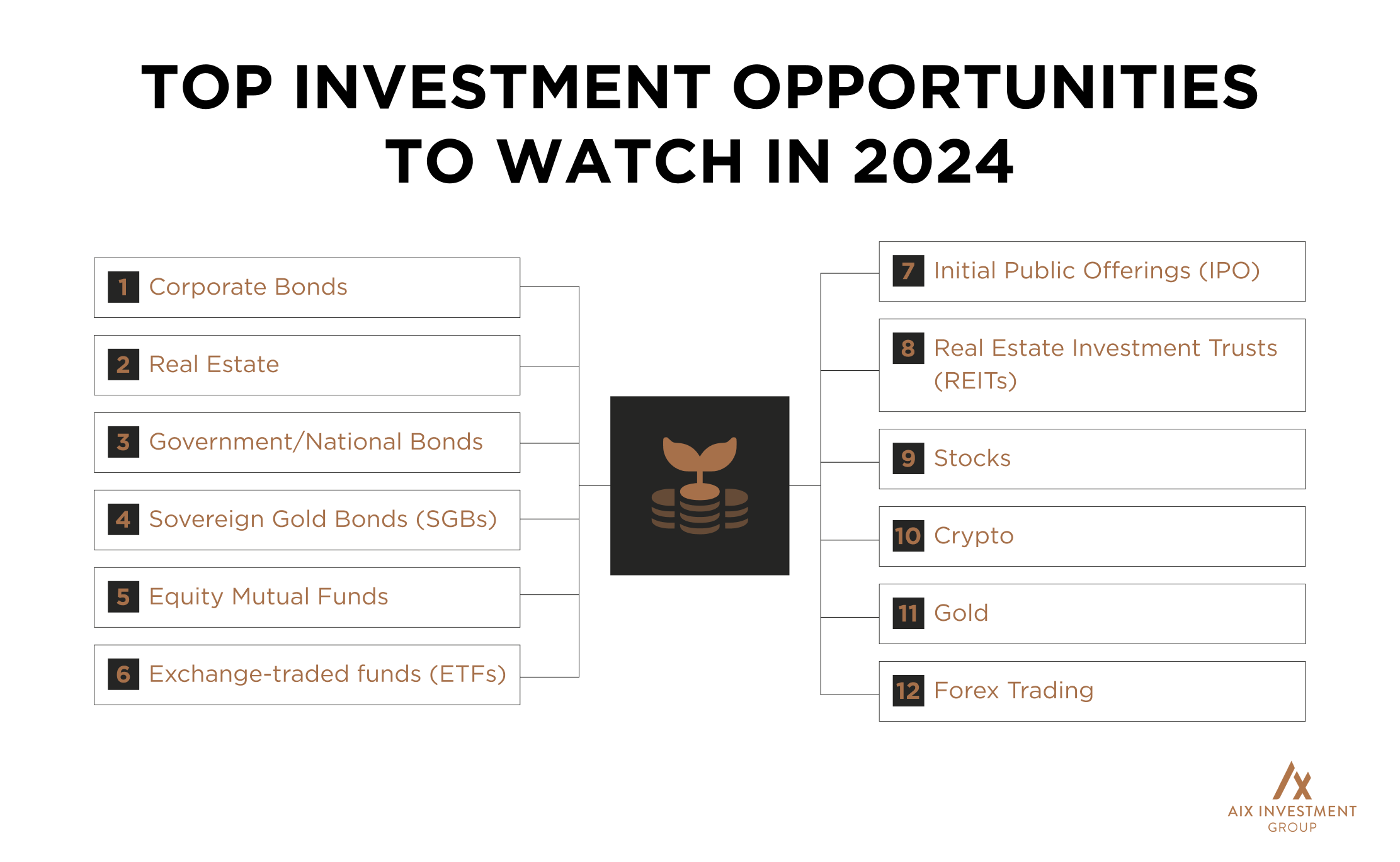
Remember that all these options carry their unique return-to-risk ratios and should only be picked after thoroughly analyzing your financial objectives, risk tolerance, and market conditions.
Getting professional advice can mitigate risks and help you navigate the investment landscape safely with the guarantee of sustainable returns.
The general topic of investing money for beginners raises many questions, doubts, and uncertainties. The truth is that investment is a harmony between choices, risks, and market conditions. It cannot be mastered overnight.
A successful investment journey demands trial and error to build expertise, which can only be achieved with time.
Even investment experts face many challenges today, given the volatile and unpredictable market conditions. Navigating the investment market as a beginner in such a sensitive environment, hoping for returns while balancing and managing risks, is challenging. This is where professional financial advisors come into play.
Financial advisors have mastered the complexities of the markets and know how to skillfully maneuver through shifting trends, economic cycles, and emerging opportunities.
They leverage their expertise to develop tailored strategies, helping beginners make informed decisions, minimize risks, and stay focused on their long-term financial goals.
Partnering with a knowledgeable advisor can significantly provide an effective guide to investment for beginners, enhance an investor’s confidence, and increase the likelihood of achieving financial freedom that aligns with one’s goals.
Professional advice from financial planners and advisors is important for the following reasons:
Start by defining your financial goals and objectives clearly. Generally, investments for beginners are focused on buying a home, retiring, or building a stream of passive income. Doing this is important to set the base for ensuring any proposed investment strategy is aligned with priorities.
Always take time to explore different investment options that fit your budget. From stocks and bonds to real estate and mutual funds, there are many different options to choose from. Understanding what’s feasible within your financial capacity allows you to make informed decisions with proper control of your finances.
Make sure that you are getting every possible doubt cleared from them. Whether it is about strategies, fees, or any unclear areas or terms, make sure you and the advisors are on the same page of understanding. Doing this is very important to feel more comfortable and engaged in the investment process.
One key area to discuss with professional advisors when seeking help with investments as beginners is expectations and concerns. This can include objectives, timeframes, and other doubts about market dynamics. Having this transparency allows advisors to address worries and set realistic goals.
Anyone wanting to learn how to invest should first analyze their risk tolerance and communicate it with advisors. Discuss how much risk you are willing to take or have the capacity to tolerate. This can range from conservative to moderate to aggressive. Understanding your risk tolerance will shape your investment choices and protect you from decisions that may cause unrest.
Thoroughly review and understand the terms and conditions of the investment agreement, including fees, withdrawal restrictions, and performance benchmarks. This ensures there are no surprises down the line and that you fully understand the commitment to your decisions.

Firstly, you need to have a clear understanding of your goals and objectives. Ask yourself why you need to invest. What do you expect out of it? What are you hoping to do with the returns?
Is it for retirement, buying a house, sponsoring your children’s education, or building wealth? Investing money for beginners should always start with a clear vision and objective.
Anyone wanting to learn how to invest effectively should have a proper plan to guide them. Start by developing a step-by-step roadmap that outlines current financial status, goals, and the best investment strategy for beginners. This will provide a clear path to achieving your goals with proper direction and focus.
The best investment strategies for beginners focus on periodically adjusting portfolios to maintain one’s desired asset allocation. This is done to ensure they remain in line with one’s risk tolerance and financial goals.
Determine your comfort level with risk, whether you prefer safer, low-return investments or are willing to take on more risk for potentially higher gains.
Always diversify your portfolio by including different asset classes (e.g., stocks, bonds, real estate) to spread risk and improve potential returns. This minimizes all potential risks associated with investing money for beginners and helps offset losses from one option using the returns of another.
Overconcentration in one stock, especially your employer’s, can increase risk due to a lack of diversification, making your portfolio vulnerable to company-specific issues.
Always have an emergency fund that is worth 3-6 months’ worth of living expenses in a liquid, easily convertible format to cover unexpected events in life without affecting your investment or the momentum of its returns.
Prioritize paying off high-interest debt before investing heavily. These debts can erode your financial gains and add unnecessary burdens, potentially reducing your ability to explore and experiment with the best investment strategy for beginners.
Investment for beginners has its fair share of uncertainties. However, it is in your hands to do proper study and research and be cautious with unfamiliar investments, unregistered advisors, or falling into “get-rich-quick” schemes. These scams can not only drain your funds but also reduce your confidence and positive perspectives on investments.
At AIX, financial experts can take you through the complexities of investing, especially if you’re a beginner seeking financial guidance.
Here are the key steps you must follow when making your first investment.
The best investment strategy for beginners varies based on individual goals, budget, and risk tolerance. However, here are some expert recommendations for those taking their first steps into investing.
Never Lose Money. This rule, popularized by investor Warren Buffett, emphasizes the importance of capital preservation. It suggests that investors should prioritize minimizing losses rather than chasing high returns.
Global Exchange Traded Funds (ETFs) provide a diversified investment option, allowing you to invest in a broad range of assets with relatively low costs. They are particularly beneficial as investments for beginners during volatile market conditions, as they can reduce risk by spreading investments across many stocks or asset classes.
Overview